Getting a license to use orchid fertilizer on air plants will save you some money while it is treating this epiphyte to get into its best look. Because you won’t be needing to find specific air plant food. But can I use orchid fertilizer on air plants?
Orchid fertilizer can be used on air plants at 1/4 of recommended strength as long as they’re low in Nitrogen, Copper, and Zinc.
Depending on the growing stage of the orchid plants, the fertilizing options available could be varied. Similarly, the NPK ratios will also depend according to the situation. I invite you to stick with me, as I explain to you what kind of orchid fertilizers would be accepted by your bromeliads.
Table of Contents
What contains in orchid fertilizers?
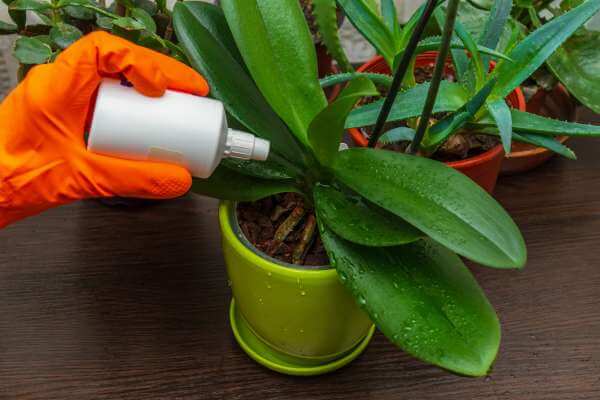
The process of, revealing what orchid food consists of, can become easy if we recognize the stages of its growth.
First, orchids have fleshy leaves which is exactly what we can see on succulents.
And on the other hand, it has quite a long growing season which requires stronger and more energized leaves.
On top of that, in many cases, manufacturers are including high nitrogen content in their products.
If you ever own an orchid plant, you may observe how well its roots have spread along the container.
Originally, orchids are a kind of epiphyte, which is taking support from a host by spreading the roots all over it, but not stealing nutrients from them.
Cause of their natural habitats, they require well enough Potassium rather than any other flowers. Therefore, many orchid fertilizers are rich in Potassium.
For the reason orchid is a flower, and it has to produce buds with diverse colors, it has a considerable amount of Phosperous. But in many cases, it seems to be lower than the other two.
In addition, you can find various micronutrients in the fertilizer.
All the nutrient proportions are labeled specifically on the fertilizer as well as the NPK ratio, where you can have a rough idea of whether you can use that orchid fertilizer on air plants.
Fertilizing requirements for air plants
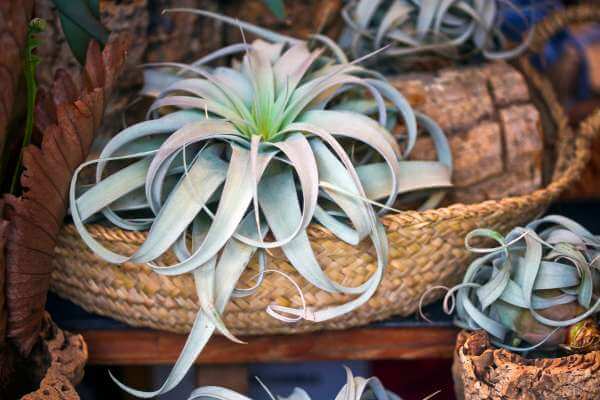
Since air plants have the qualities of the Bromeliad family, which is to extract all the nutrients from the atmosphere, we don’t need to be very conscious about fertilizing.
So, what can be the fertilizing requirements for air plants?
Just like a typical plant, these air plants are also having the requirement of Macronutrients Nitrogen, phosphorus, and Potassium.
Other than that, I can’t just guarantee you the other exact micronutrients they want to have. Because nutrients like Copper and Zinc can lead to killing the air plants.
Therefore if you are willing to use an orchid fertilizer on air plants, you have to ensure that they don’t contain too much Nitrogen, as well as, not too much Copper & Zinc.
Sometimes you can’t completely get off these two micronutrients in any kind of fertilizer, as they are not very rare.
But at least it has to be lower in ingredient percentage, since excessive can damage the epiphytes.
The thing is those kinds of nutrients are hardly supplemented through the leaves. Because they can’t be utilized in the ‘raw’ form.
Remember that some micronutrients should be in the soil in order to break them down for use.
Another thing you’ve to take care of is Nitrate, Ammonical Nitrogen, and Urea.
Those are combinations of substances, which are concentrated in high Nitrogen. It’s fair enough to contain these things in an orchid fertilizer. So you have to be aware!
Even though air plants need less attention on fertilizing, how can you know whether the plant require somewhat fertilizing?
It’s not rocket science.
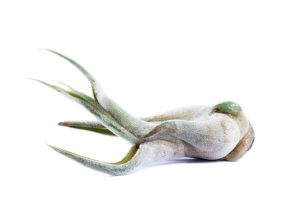
Almost every Bromeliad varieties provide flowers once they get matured. Also, they provide those elements called ‘pups’ which is their strategy for asexual transmission, rather than pollinating or seeds.
But if the air plant is producing neither after it is matured, it seems to be in trouble with lack of fertilization.
In addition, if you are witnessing faded leaves with grey in color, it might also be a hint that you are not feeding your epiphyte enough.
What kind of orchid fertilizer to use on air plants?
Until it’s not rich in Nitrogen and lacks Zinc, Copper and some other Nitrates, orchid fertilizer can be used on air plants.
It is as simple as that. Don’t take it too much.
The NPK for orchid fertilizers can range from 2-2-2 to somewhere like 25-20-25 in general. Sometimes they care more about Nitrogen because it enhances the effect of Photosynthesis in order to consume food through leaves.
For the usage of sensitive epiphytes, I recommend sticking with less than 20 in the Nitrogen content.
Let me introduce you, some of the well-known orchid fertilizers that you can use on your hanging and air-purifying air plants.
- Miracle grow orchid plant food mist
This one is 2-2-2 in NPK ratio, and it comes as a liquid. So you can work this orchid fertilizer on air plants as a mist by not even being worried about diluting.
- Better Grow orchid better bloom
This specific fertilizer is my best recommendation for you if your Bromeliad not producing ‘pups’ or flowers for its next generation. Because it concentrates on Phosphorous as it’s 11-35-15 NPK, which is encourage flowering. But just stick easy on over-fertilizing this as it can be harsh.
- Epsoma organic orchid bloom booster
It’s 1-3-1 in NPK which concentrates more on Phosphorous. This has good customer reviews and trust around this product as it really bloomed some orchids out of nowhere. And I found an experiment, and it specifically recommends this product for epiphyte orchids. So why don’t you try this orchid fertilizer on epiphyte air plants?
- Florikan Dynamite for Orchids & Bromeliads
Orchid planters often complain that the 10-10-17 ratio isn’t high enough for them with this product. But it’s not an issue for us, as long as this provides a good amount of Potassium, we can ensure a healthy and bright Bromeliad plant. That’s why it’s still something tailor-made for air plants.
- Miracle-gro Orchid plant food spikes
If you’re the guy that likes to stick with that general-purpose fit, this 10-10-10 fertilizer may suit you. You have to dilute this orchid fertilizer in order to use it on air plants. Although air plants have no soil, this fertilizer will be slow-release whenever you’re using it on a conventional flower plant.
What to fertilize for air plants other than Orchid fertilizers?
As I mentioned earlier, even though orchid fertilizers can be used on air plants, we have to stick with some specific circumstances.
Therefore, we should have some alternatives to feed air plants when necessary.
Let me share something!
I ran a questionary with a famous researcher ( Gale Langellotto ) in a well-recognized agricultural extension service (Oregano state university extension). Here is the information that I’ve come up with.
“Can I use orchid fertilizer on air plants? “
I would not use an orchid fertilizer for an air plant. Many orchid fertilizers are relatively high in Nitrogen. This type of fertilizer will make your air plants ‘leggy’. Instead, seek out a specially-formulated fertilizer for Bromeliads.
Gale Langellotto
“What are the fertilizers you recommend on air plants”
Air plants typically need very little fertilization. If fertilizing them, dilute a liquid fertilizer that is specially formulated for Bromeliads, to 1/4 the recommended dosage. The solution can be misted onto the air plants.
Gale Langellotto
What is the best fertilizer for an air plant?
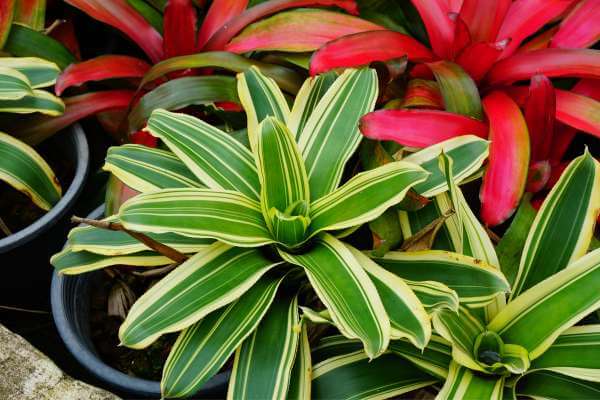
Other than using orchid fertilizer, Bromeliad plant food would be the best fertilizing option for air plants.
The reason is air plant is utterly familiar with the Bromeliad plant variety. So anything that is specifically made for Bromeliad would be a perfect suit for air plants too.
Typically, Bromeliad fertilizers are 16-9-25 in NPK, where it’s medium in Nitrogen, less in Phosphorous, and high in Potassium.
Now, as Ms.Gale Langellotto says, you’ve to use this fertilizer in a dosage of 1/4 that is recommended.
It means, if you asked to dilute 1 tbsp in a gallon of water, you’ve to just dilute a quarter tablespoon of the specific fertilizer.
To make sure above information, I asked for some personal experiences of ornamental gardeners in a Facebook community. Here’s what they told me.
Bromeliad food still works fine since you don’t stress the air plant with the complete stregnth of the fertilizer. I’m satisfied with feeding air plants in a quarter manner with them.
An air plant grower
You might also like : 7 Free Homemade Fertilizers to Bloom Ultimate Clematis!
Is there fertilizer for air plants?
Now you may wonder if there is anything that is only made for feeding air plants. If yes, we don’t have to rely on any other fertilizer.
So I searched in several places and called several garden stores. I just couldn’t find something like that 🙁
But sellers told that manufacturers don’t produce those, as fertilizing air plants is not too necessary.
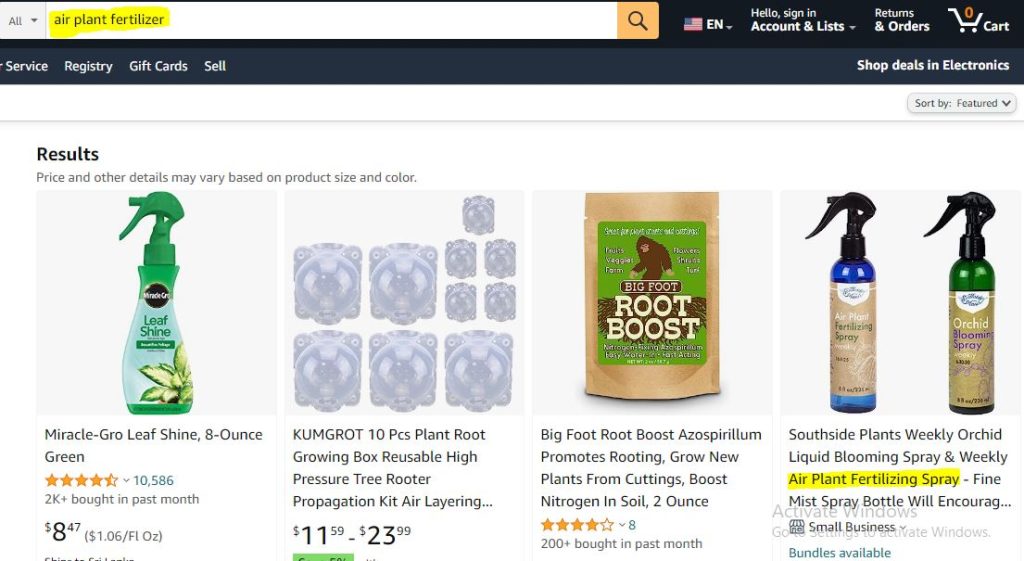
The only one I found was also just an Orchid fertilizer formula labeled as air plant fertilizer.
There are some fertilizing options you need to stay away from whether you grow air plants or any variety of epiphytes.
The origin of epiphytes is to absorb nutrients from the leaves, not from roots. But conventional fertilizers and amenities should be added into the soil and break down nutrients in order to be absorbed by the root system.
Hence, you are not allowed to feed air plants with compost tea, seaweed liquid, fish emulsion, etc.
Furthermore, high Nitrogen sources like fish emulsion, blood meal, and Urea are extremely prohibited for air plants as their Nitrogen content is raw in liquid form because it needs to break down by the soil bacteria.
How to feed air plants with orchid fertilizer?
After seeking whether to use or not orchid fertilizer on air plants, let’s get into some practical things.
To feed the air plants, first, you need to turn the fertilizer into a liquid form. In this case, also I recommend you stick with 1/4 of the measures that manufacturers advise for orchids.
There are two ways that you can feed your air plants from liquid fertilizers.
- Submerging the plant in liquid
- Spray liquid fertilizer as a mist
No matter which method you prefer since there are almost no benefits or advantages that one takes over the other.
1. Submerging the plant in liquid
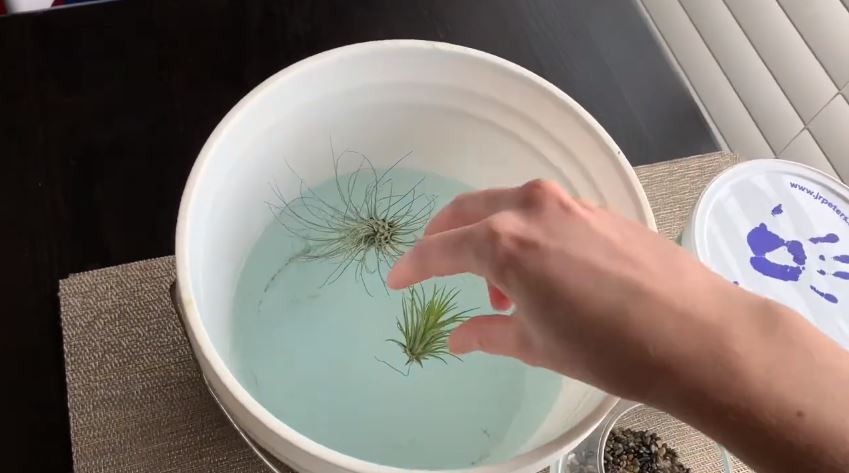
In this method, you are submerging your air plant in well-diluted orchid fertilizer for mostly 3-4 minutes. And it will allow the leaves to absorb the nutrients.
Don’t let the plant for too long in the fertilizer. It will let the leaves droop.
Once you’ve done with that time, you can take it off and shake the plant well to get rid of excess drops that can remain on the plant. If they retain for too long it may cause rotten leaves.
In addition, you can hang the plant upside down, so water will drip down from the plant.
The most important thing is you can perform both watering and fertilizing your air plant at once, without any issues.
Furthermore, you don’t have to submerge plants separately in the liquid. Take all the Bromeliads you have, make the orchid liquid fertilizer in a large container, you are good to go!
2. Spray liquid fertilizer as a mist
This method is most suitable for plants in a location where they cannot be moved around.
Imagine you hung a plant closer to your roof or ceiling. Moving that is not a practical scenario.
So you can make the liquid orchid fertilizer into a spray bottle, and mist it into the leaves.
What plants can I use orchid fertilizer on?
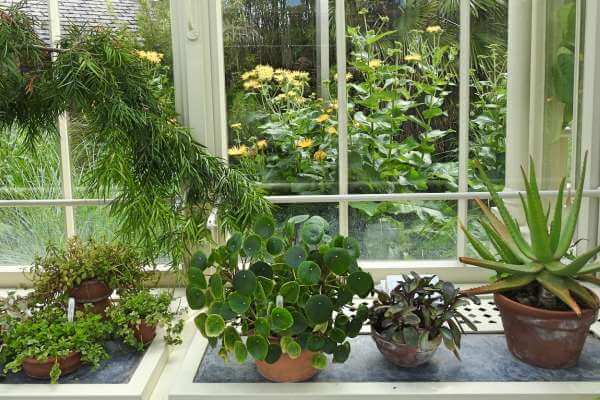
Orchid food is a perfect fertilizer for many kinds of plants that feels ‘okay’ with high Nitrogen sources.
Apparently, roses, succulents, and many other leafy houseplants as well as flowering ones prefer to get feed from orchid fertilizers.
The reason I address the houseplants, they need good enough Nitrogen and some other micronutrients to enhance their procedure of photosynthesis as they are not totally exposed to light.
On top of that, orchid fertilizer would be a great supplement for them.
Also, according to My Perfect Plants, acid-loving fruit trees and flowers like Azaleas and Camellias would love to have orchid food.
But you have to keep orchid fertilizer away from vegetable crops and whatever plants that growing for consumption.
Air plant caring tips
Whether you use orchid fertilizer on air plants or not, following these little things with your plants may help them to live a good life.
Considerations on watering
- If you are growing air plants inside the house, please care about the humidity that hovers around the plant. Especially, if the plant is in a room that has a fan, it is really low in humidity which may require more frequent watering. Similarly, if it’s somewhere in a bathroom or kitchen, watering is less frequent.
- You are not allowed to use tap water on air plants, as some minerals and substances like Calcium Chloride can burn the sensitive leaves of Bromeliad varieties. Rainwater or water from a pond or a fish tank would be the best options. If you’re the simple guy, stick with spring water.
Providing light & temperature
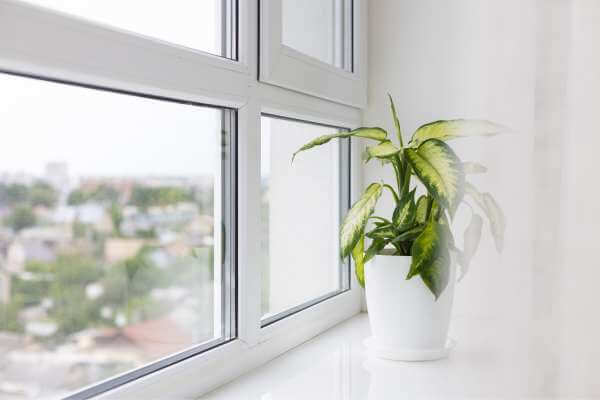
- In general, air plants prefer partial shade and indirect sunlight. Therefore if you growing indoors, you can place them near a windowsill, and if you grow them outdoors locate them under a tree as it gets some shade with slight light and heat.
- Tillandsias (air plants) love to grow up outdoors in summer. But don’t expose it to direct sun as it will ‘fry’ the leaves.
- If you are not having good sunlight conditions, don’t worry! Air plants still work with artificial grow lights.
- Air plants can’t tolerate frost as their preferable temperature is between 50 to 90 Farenhites. Treat your plants inside your house in the winter.
Other than that, cut off any dead and unhealthy leaves from the plant with a sharp pruner. It will encourage more sprouts while improving the health of existing leaves.
